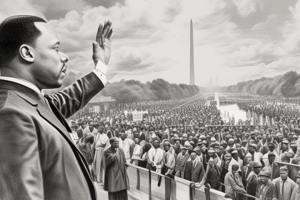Podcast
Questions and Answers
What happened in King Philip's War (1675)?
What happened in King Philip's War (1675)?
King Philip and his forces attacked nearly forty-five New England towns; the settlers counterattacked in 1676, breaking the Indians' power.
The spread of what led settlers to turn to slavery over indentured servants?
The spread of what led settlers to turn to slavery over indentured servants?
tobacco
Why was slavery developed slowly in the New World?
Why was slavery developed slowly in the New World?
Slaves were expensive and their death rate was high in the seventeenth century.
Why were black slaves/servants preferred over white or Indian workers?
Why were black slaves/servants preferred over white or Indian workers?
What did the Virginia House of Burgesses decree in 1667?
What did the Virginia House of Burgesses decree in 1667?
Why did Nathaniel Bacon rebel?
Why did Nathaniel Bacon rebel?
What happened immediately after Bacon's Rebellion?
What happened immediately after Bacon's Rebellion?
Who were a majority of Bacon's followers?
Who were a majority of Bacon's followers?
What did the Virginian men do to the black free men for revolting?
What did the Virginian men do to the black free men for revolting?
Why were all blacks enslaved and not just some of them?
Why were all blacks enslaved and not just some of them?
What did the Glorious Revolution in 1688 establish?
What did the Glorious Revolution in 1688 establish?
What did the Lords of Trade oversee?
What did the Lords of Trade oversee?
What did James II do to create wealth from 1686 to 1689?
What did James II do to create wealth from 1686 to 1689?
What resulted in America after the Glorious Revolution in England?
What resulted in America after the Glorious Revolution in England?
What was Leisler's rise and fall to power?
What was Leisler's rise and fall to power?
When did the Salem Witch Trials occur?
When did the Salem Witch Trials occur?
What was the punishment for witchcraft?
What was the punishment for witchcraft?
How many women and men were hanged for witchcraft?
How many women and men were hanged for witchcraft?
Who were the largest group of newcomers from the European continent?
Who were the largest group of newcomers from the European continent?
Indian communities were ___ integrated into the British imperial system.
Indian communities were ___ integrated into the British imperial system.
What cities were important, though they were small and very few of them?
What cities were important, though they were small and very few of them?
Flashcards are hidden until you start studying
Study Notes
King Philip's War
- King Philip's War (1675) saw attacks on approximately 45 New England towns by Native Americans, with settlers launching a counterattack in 1676, effectively ending Native power in the region.
Shift to Slavery
- The rise of tobacco cultivation contributed to a shift from indentured servitude to slavery, as demand for labor increased.
Early Slavery Development
- Slavery developed slowly in the New World due to the high cost of slaves and their significant death rate during the seventeenth century.
Preference for Black Slaves
- Disease significantly reduced Native populations, and white indentured servants were unwilling to work in challenging conditions on sugar plantations, leading to a reliance on African slaves.
Virginia House of Burgesses 1667
- The Virginia House of Burgesses decreed that religious conversion did not free a slave from bondage, establishing a crucial legal precedent.
Nathaniel Bacon's Rebellion
- Nathaniel Bacon rebelled against the wealthy planters controlling the government, as disenfranchised freemen became increasingly militant.
Aftermath of Bacon's Rebellion
- Following his rebellion, Bacon disbanded the House of Burgesses and established his own legislature, which lasted a year and enacted reforms, including expanded voting rights and reduced governor power, until quashed by an English army.
Followers of Bacon
- A significant proportion of Bacon's supporters were free African American men, highlighting racial dynamics in colonial resistance.
Consequences for Free Black Men
- Following the revolt, free African American men were enslaved, reflecting a shift towards systemic racial slavery.
Rationale for Total Enslavement
- Enslaving all black individuals eliminated the need for laws to restrict freedom and prevented the potential of organized revolts from free blacks aiding enslaved individuals.
Glorious Revolution of 1688
- The Glorious Revolution established parliamentary supremacy and ensured the Protestant succession to the English throne.
Lords of Trade
- Lords of Trade managed colonial affairs, but colonies showed resistance to comply with directives from London.
Supercolony of New England
- James II created a supercolony from 1686 to 1689 to consolidate wealth and control over New England.
Post-Revolution in America
- After the Glorious Revolution, former colonial governments were reestablished, restoring pre-revolutionary political structures.
Jacob Leisler's Leadership
- Jacob Leisler, a Calvinist, seized control of New York post-Glorious Revolution, leading to divisions along ethnic and economic lines. His subsequent execution marked a continued polarization of New York politics.
Salem Witch Trials
- The Salem Witch Trials occurred in 1691, leading to numerous accusations of witchcraft.
Witchcraft Punishments
- Execution was the punishment for those found guilty of witchcraft during the trials.
Accused Individuals
- A total of 14 women and five men were hanged for witchcraft, exemplifying the social panic of the time.
Immigrant Groups
- Germans were the largest group of newcomers from the European continent, numbering around 110,000.
Integration of Indian Communities
- Indian communities were well integrated into the British imperial system, indicating a complex relationship between Indigenous groups and colonial authorities.
Important Port Cities
- Despite their small size, port cities such as Philadelphia played significant roles in trade and the economic landscape of the colonies.
Studying That Suits You
Use AI to generate personalized quizzes and flashcards to suit your learning preferences.




